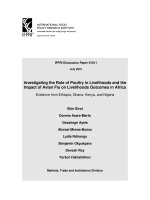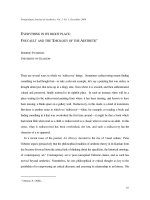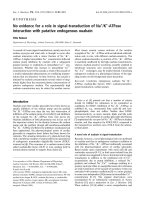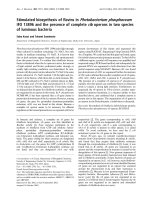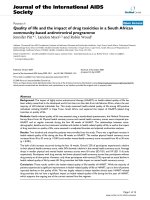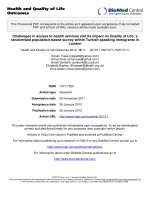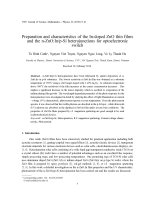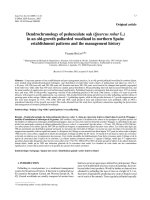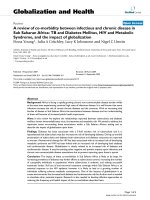Singapores role in indonesias confrontation of malaysia and the impact of confrontation on singapore indonesia relations 3
Bạn đang xem bản rút gọn của tài liệu. Xem và tải ngay bản đầy đủ của tài liệu tại đây (1.17 MB, 253 trang )
1
Chapter 1: Introduction
This dissertation examines the role Singapore played in Confrontation and
how Confrontation has affected Singapore-Indonesia relations. The orthodox
historiography of this bilateral relationship tends to start with the period of hostility
during the Confrontation years from 1963 to 1966. After the Confrontation came to an
end in 1966 when Suharto took power from Sukarno, Singapore-Indonesia relations
were still marked by hostility because of the execution of the two Indonesian marines
in 1968 despite Suharto‘s pleas for clemency. However, relations became cordial and
cooperative in 1973 until 1998 when Suharto stepped down. In the post 1998 or post
New Order period, relations have been characterised by moments of unfriendly
exchanges although the overall tenor of the relationship has remained close and
cooperative (Hamilton-Hart, 2009).
While this orthodox interpretation is commonly accepted as the way bilateral
relations progressed, the study of how British decolonisation affected bilateral
relations has not been subjected to much scrutiny. Indonesia‘s Confrontation of
Malaysia was a major event in the British decolonisation process in Southeast Asia
and has largely been examined from the domestic political and British strategic points
of view.
This dissertation highlights the agency of the political actors involved in the
politics of decolonisation, Confrontation, and nation-building during the 1960s, with a
focus on how Singapore played a central role in escalating regional tensions during
Confrontation. The focus on Singapore‘s long overlooked role during Confrontation is
important because it sheds light on the key role Confrontation played in the re-
2
organisation and development of the international relations of Southeast Asian post-
colonial states.
1
An appreciation of the role played by Singapore in relation to the role played
by Indonesia in the prelude to Confrontation which was characterised by the British
decolonisation process in Southeast Asia, the Confrontation years from 1963 to 1966,
and the aftermath of Confrontation up till 1973 when Singapore-Indonesia relations
were restored, highlights how each side drove the conflict and thus related to each
other. These years were marked by the search by both countries (although Singapore
was then briefly part of Malaysia) for their own post-colonial identity which was
played out in the form of their strategic and international behaviour during the
Confrontation years. The focus on Singapore‘s role in the prelude to Confrontation
and the years of the conflict is significant because, firstly, it challenges notions about
the hegemonic role Indonesia plays in Southeast Asia. For example, Ganesan argues
that ―Indonesian political stability and leadership are crucial to the maintenance of a
stable environment in Southeast Asia‖ and that
―in a positive situation, Indonesian hegemonic ambitions would be usefully
channelled into a regional leadership role, not unlike its primus inter pares
status in ASEAN. On the other hand, in a negative situation, the entire region
could become politically turbulent, akin to the Indonesian military
confrontation against Malaysia between 1963 and 1966‖ (2005: 81).
1
Sorensen highlighted in 1997 that the post-colonial state is one other main state prototype in the
international system in addition to the ―taken for granted‖ Westphalian state, which has largely formed
the basis for the analysis of conflict and cooperation in the international system. However, this
approach fails to ―adequately investigate substantial changes in statehood and their consequences for
conflict and cooperation‖, which requires an analysis of how ―specific types of statehood set the stage
for distinct forms of conflict and cooperation.‖ (―An Analysis of Contemporary Statehood:
Consequences for Conflict Cooperation‖, Review of International Studies, Vol.23 No.3, Jul 1997, pp.
267-268)
3
Thus, it appears that an explanation for Confrontation was that Indonesian hegemonic
ambitions were not accommodated in a positive manner. Similarly, Emmers argues
that, in the quest for hegemony in maritime Southeast Asia, ―Indonesia exercised
coercive power in the mid-1960s‖ (2005: 649) in the form of Confrontation. Emmers
also addresses the question of whether Indonesia can be regarded as a regional
hegemon possessing the ability to ―inflict punishment on a regional and international
rival, to cause a change in the distribution of power as well as the pattern of
relationships by its ability to act alone, and to develop a process to achieve consent
and restraint among rivals within a region‖ (Kapur, cited in Emmers, 2005: 647).
Indonesia, however, could not and did not act unilaterally in a way that set the
pattern of relationships in Southeast Asia. While Sukarno and his political leaders at
that time expressed their vision of what post-colonial Southeast Asia should be –
Hatta in fact echoed consistent Indonesian claims that ―Indonesia has no territorial
claims whatsoever beyond the area of the former Netherlands Indies‖ (a posture
which was consistently ignored or distrusted by Britain and her allies who held the
belief that Sukarno had to have expansionist ambitions) and that ―once Indonesia had
achieved independence, the ending of colonialism everywhere became one of the
objectives of its foreign policy‖ (1965: 139) – it did not mean that Indonesia
harboured territorial ambitions and sought regional hegemony. This was because
Singapore‘s interests and strategies relating to the establishment of Malaysia and how
the PAP collaborated with the Tunku and the British to form Malaysia were crucial
factors pushing Indonesia on the path towards Confrontation.
2
2
Poulgrain argues that ―the British played a part in fomenting confrontation to facilitate the inclusion
of Sarawak in the formation of Malaysia‖ and that ―given the conditions which prevailed in Sarawak in
late 1962 and early 1963, the principles of anti-colonialism espoused by Sukarno inevitable drew him
and Indonesia into Konfrontasi‖ (―The Genesis of Konfrontasi: Malaysia, Brunei, Indonesia, 1945-
4
Secondly, a focus on Singapore‘s role in Confrontation challenges the notion
that the relationship was asymmetrical in nature and Singapore played an essentially
reactive role in the bilateral relationship (Hamilton-Hart, 2009). This reactive role is
expressed in the form of the ―practice of foreign policy predicated on countering an
innate vulnerability (which) is a function of a minuscule scale, a predominantly ethnic
Chinese identity associated with a traditional entrepot role and also a location wedged
between the sea and airspace of two larger neighbours with which Singapore has
never been politically at ease‖ (Leifer, 2000: 1). While Confrontation was one
significant instance where Singapore was not politically at ease with both Malaysia
and Indonesia, the nature of Singapore‘s relationship with both countries was not one
where Singapore merely played a reactive role. This was shown in the key role
Singapore played in setting up the conflict through its pursuit of merger with Malaya
and internationally as a counterweight to Indonesia‘s diplomatic offensive against
Malaysia.
Indonesia‘s Confrontation against Malaysia was an enigma, beginning and
ending ―cryptically, hesitantly and shrouded in ambiguities‖ (Mackie, 1974: 1). In
fact, when Malayan Prime Minister Tunku Abdul Rahman made the public proposal
on 27 May 1961 that Malaya, Singapore, Brunei and the ―British colonial
possessions‖ of Sabah and Sarawak be ―incorporated within a single political frame‖,
the Indonesian reaction was ―neither truly sympathetic nor truly discouraging‖
(Leifer, 1983: 76). However, after the Brunei revolt in December 1962, the
Indonesian Government began to express opposition to the said Malaysia Plan.
3
1965‖, C.Hurst & Co., 1998, UK, p. 10). This dissertation illuminates how Lee Kuan Yew‘s interests
and strategies regarding Malaysia were largely aligned with and pushed along the British
decolonisation plan, resulting in Confrontation.
3
According to Leifer, ―Until the uprising in Brunei in December 1962, the only explicit opposition to
the formation of Malaysia from within Indonesia had been expressed by the Central Committee of the
5
Subsequently, the Indonesians criticised this Malaysia Plan vehemently as a British
‗neo-colonialist project‘ and as a threat to their country‘s security (Mackie, 1974: 3).
Despite Indonesian opposition to Malaysia, the new state came into being on 16
September 1963 when Malaya merged with the former British colonies of Singapore,
Sabah and Sarawak. Indonesia‘s subsequent launch of Confrontation against Malaysia
was described by The Times of London as ―the most irrational of all recent disputes‖
(Boyce, 1968: xi). This dissertation argues that it is through an analysis of Southeast
Asian, in particular, Singaporean and Indonesian perspectives, strategic interests and
behaviour with regard to the concept of Malaysia and Malaysia‘s formation, as well as
how Confrontation was really a means for establishing a postcolonial international
foundation for Southeast Asia through ―creative destruction‖, that we can understand
the ―irrationality‖ of this conflict – why it started and took the course it did.
1.1 The formation of Malaysia: The key role of Tunku Abdul Rahman and Lee
Kuan Yew
Indonesia‘s opposition to the newly created state that was Malaysia was based
on the perception that Malaya‘s independence which was declared by the Tunku on 31
August 1957 was a ―sham while the making of Malaysia was a neo-colonial
conspiracy‖ (Stockwell, in Burroughs and Stockwell (eds) 1998: 139). According to
Fieldhouse, ―neo-colonialism came into general use only in the 1950s as a
consequence of the withdrawal of political control from an increasing number of
European colonies; and its implication is that for a less developed country the normal
end of colonialism does not necessarily result in genuine independence‖ (1981: 8).
Communist Party in December 1961. The significance of such opposition was less in its timing than in
its terms, which foreshadowed the idiom in which Sukarno was to reject the legitimacy of the new
federation. It was described as ‗a new concentration of colonial forces on the very frontiers of
Indonesia‘ and ‗an unacceptable colonial intrigue‘‖. (―Indonesia‘s Foreign Policy‖, Allen and Unwin,
1983, UK, p. 77)
6
Malaysia was regarded by its detractors as the embodiment of neo-colonialism in
Southeast Asia because it appeared to maintain British hegemony over its constituent
parts which all had shared the experience of British colonial rule. The perpetuation of
British influence over the post-colonial state of Malaysia was made possible due to
the state-society relationships and institutions established during colonial times
(Stockwell, 1998: 139).
Stockwell questions whether Malaysia‘s establishment was the making of a
neo-colony, arguing that ―neo-colonialism is flawed so far as Anglo-Malayan
relations are concerned (and) a preliminary review of the government record
indicates a number of weaknesses regarding its application to the period from the
coming of independence to the formation of Malaysia‖ (Stockwell, 1998: 144).
British and Australian archival records that sketched out the course towards
Malaysia‘s establishment validate Stockwell‘s thesis. Archival records revealed that
the lead-up to Malaysia Day on 16 September 1963 was fraught with pitfalls that
reflected how British plans were influenced by the objectives and ambitions of the
Malayan, Indonesian and Singaporean leadership. One such pitfall was the pressing
concerns of the Indonesians on the question of whether the people of the North
Borneo territories were willing to be part of Malaysia, which formed the main basis
for Indonesian opposition to Malaysia and accusations that the new state was the
embodiment of British neo-colonialism. This concern was revealed by Mr
Djokojuwono of the Indonesian Department of Foreign Affairs on 13 December 1962,
shortly after the Brunei revolt, which signalled the start of a more assertive policy
against Malaysia. He emphasised Indonesia‘s natural legitimate interest in
developments in a neighbouring territory and the implementation of the Malaysia
proposal which was a threat to Indonesia‘s security. Djokojuwono went on to say that
7
―If the Malaysia plan was acceptable to the people involved and had gone
through smoothly then that was well and good. Indonesia would accept such a
situation. However, events had taken a new turn‖ (A1838/3006/4/7, 13
December 1962, NAA).
Djokojuwono also said that Indonesia was likely to ―make a statement emphasising
the need for the people of North Borneo to be fully consulted regarding
implementation of the Malaysia plan‖ (A1838/3006/4/7, 13 December 1962, NAA).
Djokojuwono‘s position portrayed one significant aspect of the difficulties faced by
the British in the last stages of the movement toward the establishment of Malaysia,
resulting in a challenge to the British de-colonisation policy of which two guiding
principles were
―that the new political leaders who assumed the reins of power when the
Colonial Office departed should be known to be amenable to continued British
investment; and the other, that the political environment envisaged by the
British as best suited to such regional development did not include Sukarno as
leader of neighbouring Indonesia‖ (Poulgrain, 1998: 6).
Therefore, Anglo-Malayan relations after Malaya‘s independence in 1957 up to
Malaysia‘s formation were not characterised by absolute British control over the
nature of the relationship and the political future of Malaysia and Indonesian
opposition towards Malaysia was one factor that threatened the disruption of the
Malaysia plan.
On the surface, Britain‘s plan to grant independence to its colonies in
Southeast Asia as one state rather than separate states seems to suggest a strong neo-
colonialist undercurrent. Although the broad official British line was that ―the aim of
8
British policy in Asia should be to encourage and persuade and help Asian countries
to conduct their own affairs in an orderly, efficient, and peaceful way‖ (Stockwell,
1998: 149), which may be reflective of the objective that the former colonies secure
genuine independence after colonial rule, the reality was that ―London was principally
concerned to achieve the merger of Singapore and Malaysia (as) (t)his was regarded
as crucial to the security of both the island and the broader region‖ (Stockwell, 1998:
149).
4
This British concern with merging Singapore with Malaya to form Malaysia
despite the practical difficulties of doing so
5
points to an aspiration to perpetuate
British influence over the post-colonial politics of the territories that were to form
Malaysia. This aspiration was expressed in the form of the Grand Design, a pet
project put forward by Malcolm MacDonald, the British Commissioner-General for
Southeast Asia in the early 1950s. By 1955, MacDonald had stated that the ultimate
goal of British colonial policy in Southeast Asia should be this Grand Design (Easter,
2004: 5-6) which later, in the 1960s, was revived as a way ―to accommodate the rising
force of nationalism in Asia-Africa if Britain‘s influence was to survive in the post-
colonial world‖, especially the ―growing nationalist assertiveness in Singapore‖
(Subritzky, 2000: 210). However, although this Grand Design was MacDonald‘s pet
project, its enactment was, to a large extent, shaped by the Tunku‘s and Lee Kuan
4
Domestically, Britain also faced tensions over the issue of how its policy towards its former colonies
should evolve. For example, ―institutional fragmentation occasionally threatened to sabotage Britain‘s
Malaysia policy (and) the perspectives of officials in Southeast Asia varied with the office which they
held and the careers they had followed‖ (See Stockwell, 1998: 148-149).
5
The difficulties in forming Malaysia lay in the sheer diversity of the various territories involved which
were connected only by the thread of British colonialism. Easter commented on this state of affairs
when he wrote that, ―in the 1950s Britain possessed a motley collection of colonies in Southeast Asia.
On the mainland there was Malaya, a major producer of rubber and tin with a mixed population of
indigenous Malays and immigrant Chinese. At the tip of the Malayan peninsula lay the small island
colony of Singapore, with a predominantly Chinese population. 435 miles to the east across the South
China Sea, Britain had two more colonies on the island of Borneo; North Borneo and Sarawak, whose
population consisted of a complex mix of Malays, Chinese and tribal peoples such as Dayaks and
Kadayans. Nestling in amongst Sarawak was the tiny Sultanate of Brunei, a British protectorate with
great potential oil wealth. Despite the differences between these individual territories, British
policymakers were periodically interested in merging them together to create an independent state‖
(2004: 5).
9
Yew‘s interests and objectives regarding the political futures of Malaya and
Singapore. This was indicative of how British neo-colonial aspirations faced an
important challenge from its former colonies.
The Greater Malaysia plan and the prelude to the establishment of the
Federation that was Malaysia, was manipulated by the political leadership in Malaya
and Singapore, showing that British did not have a free hand to do whatever they
wished. This supports Karl Hack‘s thesis that ―the reason for federation had much to
do with local developments, little to do with British plotting‖ (Hack, 2001: 275, cited
in Tan Tai Yong, 2008: 4). Similarly, archival records reveal that ―as with other
instances of decolonisation in Africa, the British, far from operating as the hegemonic
director of an orderly process of withdrawal in the early 1960s, were forced into
courses of action that they would have preferred to avoid, as bargains were struck and
timetables set by the political leaders in Malaya and Singapore‖ (Jones, 2000: 86).
These assessments are validated by Lord Selkirk, the UK High Commissioner of
Singapore and British Commissioner in Southeast Asia, who remarked that
―Whitehall in fact took no initiative until the Federation had been proposed,
first in private and then in public, by the Prime Minister of Malaya and
immediately supported by the Prime Minister of Singapore It was only after
the proposals had been endorsed by all the territories concerned that Whitehall
gave its full cooperation to the establishment of the Federation and sought to
make it a success‖ (Selkirk, 1965, cited in Tan Tai Yong, 2008: 4).
Therefore, while the idea of Malaysia had its origins in British neo-colonialist
aspirations, it was the political leadership in Malaya and Singapore that drove the
state-building project forward.
10
The Tunku‘s role was crucial in bringing about Malaysia and improvising on
the British Grand Design which was essentially a blueprint for the de-colonisation
process in Southeast Asia to solve the following two separate problems. The Grand
Design
―would provide a viable political entity for the Borneo colonies, considered
too small and unsophisticated to survive by themselves as an independent
state; and it would allow the transfer to the Malayans of responsibility for
internal security in Singapore, thereby relieving Britain of an onerous, costly,
and politically demanding task‖ (Subritzky, 2000: 210).
The British wanted the Grand Design to be ―gradualist‖ because the Colonial Office
believed that Britain ―would first have to bring the Borneans to political maturity‖
(Easter, 2004: 6). However, the Tunku had other plans. He perceived the usefulness of
the Grand Design as a means to ―forestall possible Indonesian or Philippine claims on
the Borneo colonies (and) more importantly, he saw it as a way of merging the
economically important colony of Singapore with Malaya without disrupting
Malaya‘s delicate racial balance‖ (Easter, 2004: 6). Thus, the Tunku made the so-
called ―historic‖ announcement on 27 May 1961 in Singapore when he ―sounded the
possibility of bringing the territories of Singapore, Borneo, Brunei and Sarawak and
the Federation of Malaya closer together in political and economic cooperation‖ (Tan
Tai Yong, 2008: 4). By making this announcement, the Tunku revived the British
strategy for divesting control over its colonies in Southeast Asia.
The British Grand Design was therefore to a large extent, pushed along by the
Tunku who then invited Lee Kuan Yew, who was Singapore‘s Prime Minister, on 25
July 1961, ―to engage in preliminary discussions on the future constitutional
11
relationship‖ (Sadka, 1962: 21) between Malaya and Singapore. This was indicative
of how the Malaya and Singapore political leadership exerted their influence on the
Malaysia Plan, which resulted in an issuance of a joint communiqué on 24 August
1961 by the Tunku and Lee Kuan Yew which gave
the main outlines of their agreement. On October 18, the Federal House of
Representatives approved the principle of Malaysia and endorsed their
Government‘s initiative in taking action for its realisation. On November 16,
the (Tunku) left for talks in London on the future of the Singapore base and
the mode of consultation with the Borneo territories, and on November 22, the
British and Malayan governments declared their agreement in principle, and
the (Tunku) forecast that merger would take place in 1962. At the same time,
the Federation and Singapore governments issued a White Paper setting out
heads of agreement so far reached (Sadka, 1962: 21-22).
These events suggest that the Tunku was the main initiator of Malaysia.
6
While the
Tunku‘s announcement on 27 May 1961 ―has often been taken as the genesis of the
Malaysia idea, which saw its fruition two years later, in September 1963‖ (Tan Tai
Yong, 2008: 4), the reality was that Lee Kuan Yew too had a significant role to play
in the materialisation of Malaysia.
The roots of Lee Kuan Yew‘s involvement in the formation process of
Malaysia lay in the British vexation over Singapore‘s sizeable Chinese population that
―was becoming increasingly resentful of their colonial status, personified by the still
6
The Tunku‘s motivations were political and strategic in nature. According to Subritzsky, ―…by 1961,
the Tunku himself had become very disturbed with developments in Singapore. In short, he feared that
a predominantly Chinese communist state, analogous to Cuba in the western hemisphere, was about to
be created on Malaya‘s borders. He was therefore receptive to the arguments of Sir Geofroy Tory,
British high commissioner in Kuala Lumpur, that federation was the only realistic alternative‖ (1999:
26).
12
substantial British military presence on the island‖ (Subritzky, 1999: 25). Both the
British and the Tunku feared that the Barisan Sosialis, which was regarded as being
strongly influenced by communist ideology, would come to power in Singapore, thus
not only bringing a communist threat right to Malaya‘s doorstep, but also crippling
the British base on the island by industrial chaos due to the widespread local support
from organised labour enjoyed by the Barisan. According to Murfett et al., Lee Kuan
Yew
―supported British arrangements to expand the bases and adopted an agenda
crowned by two items: a merger with Malaya, to give Singapore the political
depth to crush the communists and the economic and military space to survive
and thrive; and internal stability, in part to keep the British comfortable with
the commitment to maintain large bases in Singapore. Lee regarded the British
presence as essential to make Singapore more secure and boost its economy
during the years of transition needed to bring about a successful merger‖
(1999: 311).
The British concern over the potential hostility from the Barisan over the former‘s
bases in Singapore provided the impetus for Lee Kuan Yew to push harder for the
establishment of Malaysia as a means to realise the PAP long-held vision of a ―united
Malaya inclusive of Singapore‖ which the PAP began to work assiduously for since it
was voted into power in May 1959 (Lau, 1998: 10).
Lee Kuan Yew‘s urgency in pursuing merger was a crucial variable in the
process of forming Malaysia. Lee Kuan Yew‘s sense of urgency, like the Tunku‘s,
was based on political self-interest and strategic calculations, which were anchored in
his perception that
13
―Singapore‘s exclusion from Malaya was the result of a ‗freak man-made
frontier‘ (and) had the British heeded the history of the peoples of Malaya and
geography and economic realities they would have put Singapore into the
Malayan Union, just like Penang and Malacca‖ (Lau, 1998: 10).
Thus, Lee Kuan Yew visited London in May 1962 and used the visit as one platform
to stress to the British ministers ―the need for urgency in establishing Malaysia‖
7
(DO169/249, 14 September 1963, National Archives, UK).
As for Lee Kuan Yew‘s state and political survival imperatives, they can be
summarised as follows. First, without merger, Singapore could not survive politically
or economically because it had no natural resources and was faced with a decline in
entrepot trade, coupled with a burgeoning population which needed jobs. Merger
would give Singapore a much-needed ―hinterland‖ to ―provide a bigger market for its
manufactured goods‖. Furthermore, Britain would not agree to an independent
Singapore state that was ―not economically viable‖. Second, ―the 1959 self-governing
constitution was due for review in 1963, with independence as the next logical step‖
and the PAP‘s political survival was tied with its ability ―to achieve independence for
Singapore‖. Finally, ―merger was politically beneficial to the PAP‖ because ―its
erstwhile left-wing communist opponents would be politically neutralised in a Malaya
headed by a right-wing and anti-communist government‖ (Lau, 1998: 10). Thus, there
was a strong anti-communist element underpinning Lee Kuan Yew‘s and the PAP
7
Lee Kuan Yew also expressed that ―merger could take place forthwith (during a talk on the formation
of Malaysia with the Tunku and the British on 29 July 1962) and was disappointed that the wording ‗by
the 31
st
August 1963‘ for the coming into being of Malaysia could not be altered for a specific and
earlier date. On his way to London he had appeared, at his own request, before the committee of 17 at
the United Nations in New York to explain the position of the Singapore Government with regard to
his forthcoming referendum and to explain and justify his policy of merger‖ (DO169/249, 14
September 1963, National Archives, UK). His actions and behaviour reinforced the fact that he was
anxious about achieving merger as soon as possible.
14
leadership‘s pursuit of merger as the sole means to ensure Singapore‘s viability post-
British colonial rule.
This strong anti-communist sentiment came to a head in the form of Operation
Cold Store, which was a crucial event that greatly facilitated the process towards the
establishment of Malaysia. Cold Store, which took place in the early hours of 2
February 1963 in Singapore, saw the arrest of ―over 100 opposition party leaders,
trade unionists, student unionists, journalists and political activists who had voiced
their dissent of the Malaysia project‖ (Zahari, 2007: 11). These were groups of people
who
―opposed the merger of Singapore with Malaya and subsequently the
formation of Malaysia, (were) labelled communist, pro-communist or a
supporter of communists. According to (the British), ‗only the communists
opposed the merger and the Malaysia state project‘‖ (Zahari, 2007: 9).
It was therefore ―imperative that leaders of the opposition parties who voiced out
against merger and the colonialist project, Malaysia, be taken into custody‖ (Zahari,
2007: 9). According to former Singapore journalist and Cold Store detainee Said
Zahari, ―the Singapore, Malaya and British authorities conspired to amplify the
dangers of the communist threat to strike fear among the people especially the
Malays‖ and the Tunku, Lee Kuan Yew and the ―British colonialists‖ had worked
―throughout 1962‖ to find ―a common solution towards destroying their dissenters in
Singapore‖ (2007: xviii, 9). Thus, the significance of Cold Store was that it reflected
the British motivation in ensuring ―the success in the formation of Malaysia, its neo-
colonial project, and simultaneously, protect its colonial interests in Southeast Asia‖
(Zahari, 2007: 10).
15
However, Cold Store, despite becoming intertwined in the web of British
intrigue, cannot lend support to the claim that Malaysia was therefore a neo-
colonialist project. Instead, it appeared that Lee Kuan Yew and the Tunku had
differences in terms of when to carry out the operation and who was to do it. For the
British, they
―were not concerned with when or who carried out the arrests. What was
crucial to the British was that LKY‘s political opponents were arrested and
detained under the Act. Only an act of such proportion would ensure the
success in the formation of Malaysia ‖ (Zahari, 2007: 10).
Thus, the Tunku and Lee Kuan Yew were left to decide the timing of the operation
and who was to carry it out. Lee Kuan Yew ―wanted the arrests to be made after the
formation of Malaysia and carried out by the Malaysian government‖, effectively
wanting to ―wash his hands off the arrests‖. However, the Tunku wanted otherwise
and pressured Lee Kuan Yew to carry out Cold Store because the Tunku wanted Cold
Store to be a ―Singapore initiative‖ and ―the PAP leadership to purge Singapore of
communist groups and its elements before the merger of Singapore with Malaya for
the formation of Malaysia‖. Otherwise the Tunku ―would not agree for Singapore to
be a part of the Federation of Malaysia‖ (Zahari, 2007: 10). This aspect of Cold Store
brings to our attention how the British were not ―operating as the hegemonic director
of an orderly process of withdrawal in the early 1960s (and) were forced into courses
of action that they would have preferred to avoid
8
, as bargains were struck and
8
According to Matthew Jones, from the British perspective, Cold Store was supremely ironic because
the main intention for a Greater Malaysia was to transfer responsibility for Singapore‘s internal security
to the authorities in Kuala Lumpur so as to steer away domestic and international criticism on what
could be perceived as an example of British ―traditional colonial repression‖. However, the British
found themselves having to give more forthcoming support to Cold Store, which they initially were
hesitant about because of the need to assure the Tunku about the political situation in Singapore as well
as to improve Lee Kuan Yew‘s position in the Singapore referendum campaign. Ultimately, the British
16
timetables set by the political leaders in Malaya and Singapore‖ (Jones, 2000: 86).
Therefore, Cold Store was an exercise in local agency on the part of the political elites
of Singapore and Malaysia.
For Britain, Malaysia was viewed as the perfect plan to preserve Britain‘s
strategic and political interests in Southeast Asia by way of securing the political
future of the politically immature and weak Borneo territories as part of a bigger
federation, preserving a pro-British and anti-communist Government in Singapore,
and solving London‘s problem of ―an expensive military burden at a time when
Britain‘s economy looked unable to sustain a global defence role‖. Furthermore,
Malaysia would provide Britain the opportunity to ―ride the wave of decolonisation
and retain a military base in an independent Asian ally rather than an outmoded
colonial enclave‖ (Easter, 2004: 21). However, this impeccable concept of Malaysia
was sorely tested and subverted by Malayan, Singaporean, and subsequently,
Indonesian political leaders. Ultimately, the process of Malaysia‘s establishment was
not marked by British ―mastery over the planning and execution of the ‗grand
design‘‖ (Stockwell, 1998: 152). Rather, it highlighted the crucial role Southeast
Asian elites like the Tunku and Lee Kuan Yew took on in driving the Malaysia
project forward and the reasons why the Indonesian leadership perceived the project
to be a neo-colonialist one and mounted Confrontation against the new state when the
evidence points to the contrary that Britain had hegemony over the state-formation
process. This state of affairs is explained through a focus on the Indonesian and
Singaporean perspectives or understanding of the concept of Malaysia.
attempt to divest control over Singapore‘s internal security led Britain to ironically become more
involved in Singapore‘s internal security situation by lending stronger support to Cold Store.
(―Creating Malaysia: Singapore Security, the Borneo Territories, and the Contours of British Policy,
1961-63‖, The Journal of Imperial and Commonwealth History, Vol.28 No.2, May 2000, p. 106)
17
1.2 Indonesian and Singaporean perspectives on Malaysia as a key driver of
Confrontation
The concept of Malaysia was rooted in the neo-colonial intentions
9
of the
British which were ―to maintain rather than end Britain‘s historic interests in the
region‖ (Subritzky, 2000: 211). These intentions were reflected in the declaration by
Harold Watkinson, then British Defense Minister, in March 1962 that
―he could not see British military forces withdrawing from their Singapore
bases in the foreseeable future. Moreover, he continued, consultations between
the British and Malayan governments were underway for a military build-up
in connection with the proposed Malaysian federation to cope with security in
the additional territories of Sarawak, Brunei and North Borneo‖ (Van der
Kroef, 1963: 175).
In addition, the fact that ―the British needed Singapore so much for their broader
strategy, and had such reservations about its internal stability, that they resisted any
idea of granting genuine independence to the island by itself‖ (Murfett et al, 1999:
310), demonstrates British intentions to perpetuate their influence in Southeast Asia
through Malaysia.
9
According to Subritzky, historians have differing views on what the British government‘s overall
intention was with regard to the pursuit of decolonisation through Greater Malaysia. One view is that
Malaysia‘s formation was arranged to assist British withdrawal from the region and Greater Malaysia
was designed to enable the British to continue to bring to bear greater control over the decolonisation
process and avoid political instability after their departure. Another interpretation is that the British
were responding to an altered political environment in which formal rule from London was no longer
feasible. Instead, British influence could still be retained, albeit by more indirect means, like self-
government within the British Commonwealth. This option gave the British hope that still pervasive
bilateral ties in finance, trade and defence, would continue to tie Malaysia to Britain, thus safeguarding
British influence long after formal independence had been granted. Such an arrangement would be
reminiscent of ‗informal empire‘‖ (―Britain, Konfrontasi, and the End of Empire in Southeast Asia,
1961-65‖, International Diplomacy and Colonial Retreat, p. 211). Both interpretations, however, point
to the British intention of creating Malaysia as a means of stamping British influence on the political
future of the federation and Southeast Asia, thus indicating that Malaysia was not genuinely
independent.
18
However, one of the major factors that frustrated British intentions to manage
their decolonisation process in Southeast Asia in order to serve their strategic interests
was Indonesia‘s Confrontation of the newly formed Malaysian Federation, which
caused the British to lose significant control over the process of the Federation‘s
formation. Besides contending with the interests of the Tunku and Lee Kuan Yew
10
,
Confrontation meant that the British found themselves having ―to resist Indonesian
attempts to abort, destabilize, or splinter Malaysia until Indonesian authorities
dropped the policy of Confrontation, recognised Malaysia, established normal
diplomatic relations with it, and agreed to live in peaceful coexistence‖ (Farrell, in
Murfett (ed), 2010: 74). In fact, the establishment of Malaysia and Indonesia‘s policy
of Confrontation which followed promptly on its heels was marked by Britain‘s
―fairly limited‖ role and instead marked as ―the beginning of a new era in the
international relations of Southeast Asia‖ (Butwell, 1964: 946). This was reflected in
the limits to which the British could force the Malaysia plan through. The Tunku was
the one who revived hopes for a Malaysian Federation in 1961 and that
―notwithstanding Malcolm MacDonald‘s enthusiasm for closer association and
despite his optimism in the willingness of peninsular and island elites to combine in a
common endeavour, ingrained Malay distrust of Chinese-dominated Singapore
deterred the British government from pushing ahead with merger in what were
generally seen to be unpropitious circumstances‖ (Stockwell, 1998: 145). Also, more
importantly,
10
The Tunku‘s influence on the British plan for creating Malaysia was to make sure that the inclusion
of Singapore was not going to upset the Federation‘s racial balance and for the Federation to act as a
bulwark against communism. For Lee Kuan Yew and his PAP cadres like Dr Toh Chin Chye, the
maxim, ―outright independence would lead the people of Singapore to disaster‖ (CO1030/1124, 12
June 1961, National Archives, UK), drove their determined attempts to aid in the materialisation of
Malaysia.
19
―the impact of Malaysia upon the international politics of Southeast Asia is to
be seen largely in its contribution to this evolutionary change in the character
of such politics – which increasingly stress the interaction among Southeast
Asian countries rather than the relationship between them and other powers.
By interaction is not meant cooperation; the relationship may be, and
frequently is, one of hostility‖ (Butwell, 1964: 941).
The embodiment of such a new pattern of state interaction in Southeast Asia was
Indonesia‘s Confrontation of Malaysia which was essentially a ―controversy
concerning Malaysia‘s establishment, legitimacy, and future‖ (Butwell, 1064: 942)
playing out among the Southeast Asian states.
The heart of this debate over the legitimacy of Malaysia‘s independence and
the attendant perception that it was a neo-colonialist British creation lay in
Indonesia‘s and Singapore‘s perception of the newly created state and the principles
which it was built on. This aspect of Confrontation connected with ―local‖
perspectives from the political actors involved in the conflict and for who the conflict
was crucial has been relatively under-studied. However, this clash of perspectives
between the Singapore and Indonesia political leadership provides an important
perspective to understand the origins of the conflict, its course, how it ended, and the
extent to which it has affected the pattern of interaction between Singapore and
Indonesia, which is also relatively under-analysed.
The benefit of focusing on comparing Singapore‘s and Indonesia‘s perceptions
of Malaysia is due to the important but under-examined role that Singapore‘s PAP
leadership under Lee Kuan Yew played in the origins of Confrontation and how this
conflict evolved. This involves exploring a watershed event in Singapore‘s political
20
history, Operation Cold Store, which played a crucial role in the origins of the
conflict. Also, it is through a focus on Singapore‘s role in Confrontation that we can
examine the reasons why Indonesia viewed Malaysia as a neo-colonialist project and
decided to launch the Confrontation policy. Similarly, it is through an examination of
how the ―local‖ leadership in Singapore and Indonesia interacted with each other
during Confrontation, which was essentially the debate over the legitimacy of
Malaysia, that we are able to elicit the effects of a major foreign policy event or
international conflict on bilateral relations after the conflict ended.
A core aspect of the way Confrontation drove Singapore (then part of
Malaysia)-Indonesia relations was the debate over the legitimacy of the new
Malaysian Federation and whether it was formed in accordance with the people‘s will.
Singapore and Indonesia adopted diametrically opposite positions on this subject. The
Indonesian perception, as expressed in General Nasution‘s article ―Confrontation: Our
fight against neo-colonialism‖, was that ―Malaysia‘s independence was granted by the
British as a present. It is understandable, therefore, that the greater part of
‗Malaysia‘s‘ life is still controlled by the colonialists‖ (A1838/3006/4/7, 11 January
1964, NAA). Singapore‘s Prime Minister, Lee Kuan Yew, on the other hand,
declared,
―Let no one doubt that Malaysia is no neo colonialist plot. We have decided
this day to go ahead in unity willingly and freely with our brothers in Malaya,
Sabah and Sarawak ‖ (DO187/31, 18 September 1963, National Archives,
UK).
21
Thus, the issue at the heart of Confrontation was whether Malaysia was formed in
accordance with the free will of the people involved or if it was a ―present‖ from the
British with strings attached that would render Malaysia‘s independence inauthentic.
Other hypotheses about the causes of Confrontation mostly focus on
Indonesia‘s domestic politics. For example, Hindley argued that ―the policy of
confrontation serves the domestic political and economic interests of many of the
persons and groups comprising the Indonesian political elite‖ (1964: 905). Similarly,
Weinstein argued that Confrontation essentially had its roots in the domestic political
realm – ―the Crush Malaysia campaign was to a significant extent dependent on
confrontation‘s ability to perform important political functions for the principal actors
and for the system as a whole‖ (1969: 9). Gordon pursued the argument that the
convergence of Indonesia‘s irredentism which is related to the classic problems of
boundaries and territory, with Indonesia‘s special brand of national ideology, could
explain why Indonesia ―begins to appear as the potentially most troublesome actor in
Southeast Asia‖ (1964-1964: 379). Gordon advanced the thesis that Confrontation and
―Sukarno‘s refusal to accept U Thant‘s determination that the establishment of
Malaysia is supported by its resident peoples are merely the most recent surface
manifestations of a deeper problem (whose) source of the threat lies largely in what
appears to be a continuing expansionist sentiment among Indonesian leaders‖ (1963-
1964: 378-379).
The perspective that Confrontation was a Sukarno-driven policy which has its
roots in Indonesia‘s glorious past of Srivijaya and Majapahit is presented in a SAF
journal, Pointer, by one Captain Benedict Ang who writes,
22
―the Srivijaya and Majapahit empires had provided inspiration for Sukarno‘s
concept of Indonesian territory. Indeed, Sukarno‘s perception of what
constituted Indonesia was arguably the prime motivating factor that led him to
pursue a confrontational policy against the Dutch over Irian Jaya in 1962 and
later against the British over the formation of the Federation of Malaysia in
1963‖ (1998).
This viewpoint expressed in Singapore‘s military journal is intriguing because firstly,
it corroborates Singapore‘s main foreign policy principle of innate vulnerability in
relation to its aggressive immediate neighbours of Indonesia and Malaysia, and
reflects the notion that Singapore was a passive victim of Confrontation. Secondly, it
echoes Gordon‘s thesis during the Confrontation years that Sukarno and his leaders
harboured expansionist ambitions. This is at odds with Sutter‘s assessment that
Jakarta and Peking thought of dividing Southeast Asia into spheres of influence under
Peking, Hanoi and Jakarta (1966: 532), which suggests that Indonesian aims for
having a Southeast Asian sphere of influence could have been driven by the objective
of achieving ideological solidarity with Peking, perhaps with the intention of both
sides to enter a ―marriage of convenience‖ to pursue their expansionary aims. Thus,
Indonesian ―expansionist‖ ambitions could have been essentially framed by
international politics of the time rather than due to historical glory. Indonesian
intentions toward other parts of Southeast Asia therefore were murky during the
Confrontation years. For example, the Australian embassy in Jakarta was
unconvinced about the apparent lack of display of Indonesian expansionist ambitions.
According to an Australian report ―Indonesian relations with Malaya‖ dated 3 July
1961,
23
―We have had reports about Dr Subandrio‘s idea of having Singapore become
part of Indonesia and his privately expressed view that the British Borneo
Territories should form part of the Indonesian island of Kalimantan. However,
Dr Subandrio and the Indonesian government have been meticulously careful
to avoid laying themselves open to the charge that if their claim to the territory
of West New Guinea were met, this would be the first step only in a series of
territorial claims, for example to Portuguese Timor, British Borneo and,
possibly, Singapore and Malaya If the Indonesians have territorial ambitions
towards British Borneo or Singapore, they remain concealed in the minds of
their leaders‖ (A1838/3006/4/7, NAA).
While this assessment took place during the period when Indonesia had yet to voice
strong opposition to the Malaysia plan, it is nevertheless significant because it
revealed the fear that Indonesia might be inherently expansionist. However, in a sign
that the times were uncertain, the Australian report concluded,
― any interest which Indonesia might show in the North Borneo territories or
Singapore is not necessarily to be feared by us as an example of territorial
aggression. It should also be examined as a possible means whereby a hostile
Chinese influence in that area could best be controlled‖ (A1838/3006/4/7, 3
July 1961, NAA).
This conclusion was echoed by Kahin later in 1964 when he wrote that the primary
reason for the establishment of Malaysia and a crucial reason for Indonesian and
Filipino opposition to this new state was the concern over the political potential of the
largest group of overseas Chinese in the world. A main preoccupation for the British
and Malayan supporters of Malaysia as well as the Indonesian and Philippine
24
promoters of the rival ‗Maphilindo‘ concept was how to exert political control over ―a
culturally self-conscious group which is not only numerically the largest, but
economically much the strongest and educationally by far the most advanced of all of
Malaysia‘s people‖, or at least isolate them from Peking‘s political influence (Kahin,
1964: 254). Kahin‘s assessment signals an alternative view that Confrontation was not
merely the product of Indonesia‘s domestic political situation and that Indonesia was
not in complete control of the course that Confrontation took. Instead, it appears that a
characteristic of Confrontation was that it was more of a response to external events
than a policy designed to throw the first punch at Malaysia.
This perspective of Confrontation highlights the fact that external forces
influenced why and how Indonesia pursued Confrontation. One of the most
comprehensive studies about how British intelligence acted as agent provocateur,
setting up Indonesia‘s inexorable decision to launch Confrontation, was covered by
Poulgrain who reviewed ―the historical role of Sukarno as the initiator of
confrontation‖. Poulgrain also questioned Mackie‘s attribution of ―sole culpability to
Indonesia when a motive clearly existed for colonial authorities to play a role in
fomenting disturbance‖ (Poulgrain, 1998: 6). Similarly, Easter analysed Britain‘s role
in Confrontation from 1960 to 1966, arguing that British defence and strategic
interests in Southeast Asia seemed to drive British policy in Confrontation. In turn,
―Indonesia challenged Britain‘s goals through Confrontation and it is clear
from Indonesian public statements and western intelligence reports that Jakarta
objected to Malaysia not just because it wanted a proper process of national
self-determination for Borneo, but also because it opposed the British military
presence in Singapore Confrontation can be seen as an attempt by a rising
25
middle power to oust the British imperialists and establish control in the
region ‖ (Easter, 2004: 197).
Easter took the position that Confrontation was a response to external forces, in this
case, British strategic interests, thereby shifting the focus of scholarship on
Confrontation from one that is Sukarno and Indonesia-centric to one which also
examines the role of other political actors in the conflict.
Singapore was one political actor that played a significant role in
Confrontation which however remains relatively neglected. In fact, Poulgrain points
out that
―Jakarta‘s irreverent attitude towards the British colonial authorities and
Malayan political elites was encouraged further by Singapore‘s regional
entrepot function which included the illegal trading of Indonesian primary
commodities. The smuggling of primary commodities by Chinese traders
based in Singapore and tolerated by the British authorities angered Jakarta‖
(Poulgrain, 1998: 65).
Furthermore, the Indonesian elites perceived Singapore as primarily a hub for illegal
and clandestine trade which enabled Singapore to become prosperous at the expense
of Indonesia. Singapore was also viewed as a flourishing ―cultural, educational and
economic centre of regional overseas Chinese‖ which adversely affected the
Indonesian government‘s attempts to absorb its own Chinese community (Lee, 1993,
cited in Rahim, 2009: 152). These observations suggest that, firstly, Indonesia‘s
irritation and anger at the strategic purposes Singapore served for Britain could have
contributed the impetus towards Confrontation. Second, that Indonesia was angry at
